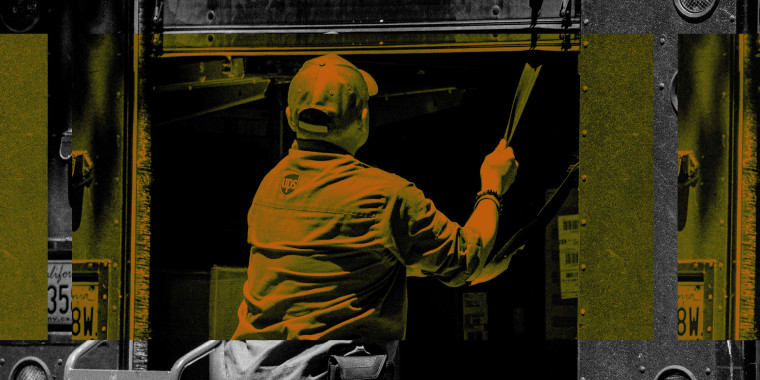A law eliminating several cities’ mandated water breaks for construction workers during heat waves took effect Friday, after the state appealed a judge’s Wednesday ruling finding the Republican-led measure unconstitutional. In the meantime, cities like Houston said they planned to continue enforcing their mandates while the case moves forward.
The wrangling comes days after Christopher Begley, a 57-year-old UPS driver of nearly 30 years, died at a hospital Sunday after collapsing during his route outside Dallas the preceding Wednesday, according to the company and union representatives. The U.S. Occupational Safety and Health Administration is investigating. An autopsy report hasn’t been released, but co-workers and local union leaders say they believe his death was heat-related.
It has been a deadly summer for workers across the country, including in Texas, which has seen some of the worst of this year’s climate-change-fueled heat waves. OSHA told NBC News it has opened investigations into more than 20 heat-related workplace fatalities in Texas this year alone.
Begley died less than a week after UPS workers approved a new five-year contract with historic heat safety provisions covering 340,000 employees. The protections — some of the best in the industry — include air conditioning and exhaust heat shields in new vehicles and more fans in package cars, but they will take time to phase in. Begley fell sick on the job on Aug. 23, the day after the vote approving the contract was announced.
It’s been a real struggle for us in the southern region because of the heat. You never know how your body is going to react until it starts to go down.
GARFIELD HOOPER, UPS UNION STEWARD, MCKINNEY, TEXAS
“We are saddened by the loss of our driver Christopher Begley and extend our deepest condolences to his family and friends,” UPS said in a statement. “We are cooperating with the authorities as they continue to investigate the cause of death. We train our people to recognize the symptoms of heat stress, and we respond immediately to any request for help.”
UPS said that a supervisor came to assist Begley after he collapsed and that he was provided with water and a cool place to rest but declined medical attention. After approving him to take the rest of the week off, the company was notified four days later that Begley had been hospitalized and later died on Aug. 27, a spokesperson said.
Garfield Hooper, a longtime co-worker and Begley’s union shop steward at their UPS building said, “It’s been a real struggle for us in the southern region because of the heat. You never know how your body is going to react until it starts to go down.”
Two months earlier, 66-year-old U.S. Postal Service mail carrier Eugene Gates collapsed on his Dallas route, during a June day when the National Weather Service issued an excessive heat warning, and later died. USPS acknowledged Gates’ death at the time, saying it was “deeply saddened,” but didn’t comment on the circumstances. OSHA is investigating the fatality as potentially heat-related.
The agency lists over 70 industries, including delivery, construction, agriculture and many types of manufacturing, as high-risk for heat illness. Recent research has found that hotter temperatures significantly raise the likelihood of injury on the job — not just in outdoor settings but at indoor workplaces, too, like the nation’s fast-growing warehouses — including injuries that aren’t obviously heat-related.
Determining that heat caused a death can be difficult for medical officials who sign death certificates, said Kristie Ebi, a professor in the University of Washington’s Center for Health and the Global Environment who studies health and heat waves.
“Official counts of people who die from heat and heat causes during a period of high temperatures are a significant undercount,” she said, adding that heat can exacerbate many factors in workplace fatalities. Researchers have found excess deaths during heat waves to be “an order of magnitude larger than what the official number is,” she said.
Heat safety concerns have drawn increasing attention from Washington officials, primarily Democrats, as temperatures rise. But federal efforts to ramp up protections are racing against both the political calendar and the climate.
Rep. Greg Casar, D-Texas, held a news conference Thursday with acting Labor Secretary Julie Su to draw attention to workplace heat risks. “It is not rational and it is not right to take workers’ water breaks and other protections away from them in the middle of a historic heat wave,” he said, citing the policy dispute in his home state.
It is not rational and it is not right to take workers’ water breaks and other protections away.
REP. GREG CASAR, D-TEXAS
Casar, one of the lawmakers pushing to heighten heat safety measures on the Hill, was previously a labor organizer who campaigned for several of the water break ordinances that the Texas law targets. “We should be providing workers with more protections, not fewer protections,” he said.
Current federal workplace heat safety requirements are minimal, though OSHA recently made the issue a top priority through several initiatives, including ramping up heat-related inspections. The agency is also working on a heat risk prevention rule that would beef up enforcement, but that will take years to go into effect. In the meantime, state and local governments can pass their own measures, experts said, often far more quickly, as Oregon and Washington state did after the 2021 heat dome.
Heat waves are becoming longer, hotter and more frequent, Ebi said, but government and corporate decisions will affect how steeply heat-related deaths rise. “The understanding of what heat does to our bodies is well known,” she said. “There are so many actions that can be taken to protect people during those periods.”
A small number of city and county governments have created chief heat officer positions to improve those protections, including in Miami, Phoenix and Los Angeles. Ebi said she isn’t aware of any such roles in Texas.
“Essentially all heat deaths are preventable,” she said.
Source: NBC News






